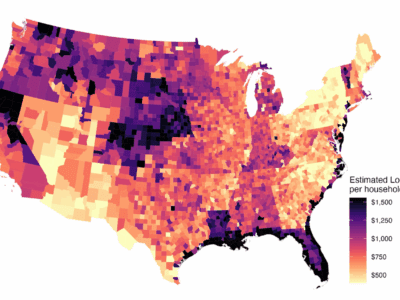Do Climate Change Cases Belong in Federal Court? The Biden Administration Weighs In.
In a very narrowly argued brief, the Administration calls for returning the cases to state court.
The Biden Administration, at the Supreme Court’s invitation, has now filed a brief giving its views about current lawsuits against oil companies. The gist of the brief is that the cases belong in state court., and that the Court should let that happen rather than stepping into the litigation. The brief is right about that, and I’m sure the people suing the oil companies are glad to have the support. But the brief could have provided more full-throated support of the lawsuits. That raises a question: Why did the government take such a narrow stance rather than addressing the broader issues presented by the lawsuits?
The case before the Supreme Court is one of a number of lawsuits brought in state court by state and local governments against fossil fuel producers, primarily oil companies. The lawsuits are based on a variety of state law claims. They generally include a claim that producing fossil fuels has created a public nuisance in the form of climate change. Most of the lawsuits also include separate claims based on misrepresentations by fossil fuel producers about the risks created by their products.
The oil companies have tried to move all these cases from state court to federal court. Normally, moving a case to federal court is possible only in two situations. The first situation is when all of the defendants are from a different state than the plaintiff. That’s not true in these cases. The second situation is when the lawsuit is based on federal law. The complaints filed in state court don’t actually mention federal law. That would seem to prevent the cases from going to federal courts. But the oil companies have come up with a complicated argument for ignoring the state-law basis of the cases.
Here’s how the argument goes. The companies first argue that the complaints belong in federal court because the state law claims are overridden by the federal law of nuisance. They then argue that the federal common law of nuisance no longer exists because carbon emissions are governed by the Clean Air Act. This is really a rock/paper/scissors argument: paper (federal common law) covers rock (state law), and scissors (Clean Air Act) cuts paper (federal common law). If that all seems a bit contrived, well I think it is.
The government’s brief doesn’t really contest the claims that the oil companies make about the federal common law and the Clean Air Act. Instead, it argues much more narrowly that those claims, even if true, wouldn’t justify moving the case to federal court.
To get an idea of how focused and technical the government’s brief is, consider how it describes the question presented by the case: It doesn’t argue that states actually have the power to award damages against the companies. (The federal government does have the power to do this, but it hasn’t done so.) Instead, the brief phrases the question much more narrowly: “Whether this suit may be removed to federal court on the ground that respondents’ state-law claims should be recharacterized as claims arising under federal common law.”
The thrust of the brief is that, even if the oil companies are right that the lawsuits are precluded by federal law, that’s not a basis for moving the cases to federal court. On the other hand, the brief doesn’t rule out the possibility that the same arguments could later require the state courts to dismiss the case.
The government’s brief makes two arguments. First, the government says, it’s unclear whether federal common law would ever have precluded state law claims, and in any event federal common law doesn’t exist anymore and therefore can’t preclude anything. Second, even if the Clean Air Act itself preempts state law claims against producers of fossil fuels, that’s a defense that the plaintiffs would have to raise in state court rather than a basis for moving the case to federal court. Both of these arguments seem to be valid.
The government’s brief might have taken a more aggressive stance. It could have argued that federal common law would never have applied to misrepresentation or fraud claims in the first place, and that the Clean Air Act does not preempt these state law claims at all. In short, the government would have been on solid ground saying that federal law simply has nothing to say about these lawsuits.
But making the broader arguments would have carried a risk. They would have strengthened the oil companies’ claim that the lower courts were divided on the relevant issues. They would also have invited the Supreme Court to consider whether these kinds of lawsuits should be in court at all. Given the Court’s strong conservative bent, that could have been a dangerous tack to take. It’s probably better to try to defuse the Court’s ideological impulses by framing the case in very technical terms.
It seems clear that the government is right about the technical issues. The big risk is that the Court will decide to ignore the technicalities and focus on the larger issue of whether allowing cases like this is good policy. If the Court phrases the questions in those terms, it’s not hard to guess how the Court will decide.
It wouldn’t be the first time the Supreme Court has played fast and loose with legal rules in the interests of what it considers a bigger goal. But it would also do nothing to allay fears that the conservative Justices are more dedicated to ideology than to the rule of law.
Reader Comments
4 Replies to “Do Climate Change Cases Belong in Federal Court? The Biden Administration Weighs In.”
Comments are closed.







Prof. Farber, Thank You for your efforts to provide UC leadership to protect quality of life for our newest and future generations. The newest UN climate report stark warning proved that we have failed to do that and we can no longer expect to to have an acceptable quality of life on earth if we continue to fail to inform, educate and motivate the peoples of the world to save our environment, and the human race today.
I don’t think we are as doomed as the writer and others suggest. I think we need to simply and rapidly stop emitting greenhouse gases, particularly CO2 and CH4, quickly and irrespective of the economic consequences, including impacts upon jobs. The longer we delay the higher these will be.
Jan, it is a most unfortunate fact of life that academics consider the public to be too “Impure” to communicate with (per Hofstadter). That is the main reason we are in so much jeopardy today. And the Power of Money has made it overwhelmingly worse, to that point where the UN has just issued their last resort stark warning. Even academics fail to heed the Lessons of History.
P.S. I keep emphasizing some of the same points after years of studying Climate Change because I think they are Most Important. I also have grandchildren, plus our newest and all future generations, whose future quality of life is my highest priority.
So I am most responsive to conclusions like Prof. Farber’s: “It wouldn’t be the first time the Supreme Court has played fast and loose with legal rules in the interests of what it considers a bigger goal. But it would also do nothing to allay fears that the conservative Justices are more dedicated to ideology than to the rule of law.”
I am also most strongly motivated by United Nations Secretary-General Antonio Guterres newest exhortation: “World on ‘thin ice — Our world needs climate action on all fronts — everything, everywhere all at once” as given in his latest UN climate report stark warning.
Thus I also repeat my points in response to Churchill’s most famous WWII exhortation: “NEVER, NEVER, NEVER GIVE UP!”